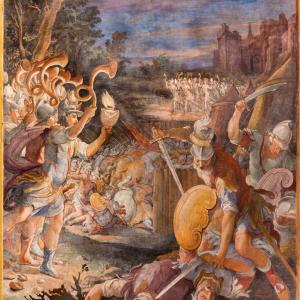In the last few posts I have offered a defense of the “literal view” of the conquest of the Canaanites. This renewed interest surrounding the justice of God’s commands to Moses to conduct herem, or total destruction, against the Canaanites was sparked by a controversial interview the YouTube skeptic Alex O’Connor conducted with Christian philosopher, William Lane Craig. In these posts, I have provided some reasons to think that even if the commands to destroy the Canaanites, to include women, children and animals, were to be taken literally, that these would not be unjust or immoral commands. A few reasons already given that mitigate our modern sensibilities about the harshness of the commands are:
- The uniqueness of the event
- The fact that the conquest of Canaan is not based on ethnicity, but on evil practices
- That sin actually acts as an environmental pollutant of the land itself
- The corporate nature of sin
In this final post, I will address two, or three, more reasons why the conquest of the Canaanites, to include the command to kill women, children and animals, is not unjust but just. But before I do that, one more word about why the attack on Canaan is not genocide.
Why The Conquest of Canaan Is Not Genocide
The most obvious reason why God’s divine command to destroy the Canaanite is not genocide in the modern sense of the term, is because the command has literally nothing to do with the ethnicity of the Canaanites. Modern-day readers and skeptics often use the language of 20th-century genocide, developed after the Holocaust to describe the Nazi attempt to eliminate, ironically, all European Jews, anachronistically to describe texts like Deuteronomy 20:16-18. However, Clay Jones explains why the attack on the Canaanites is not related to modern-day notions of genocide. Instead, God’s commands are a form of capital punishment. Jones elucidates four reasons why God’s use of the Israelites is not an instance of ethnic cleansing, but of divine justice:
First, the Lord clearly explains that He ordered the Canaanite destruction because of their sinfulness. In Leviticus chapter 18:6-23 the Lord says that the Canaanites—who lived within the territory that God had given Israel—were guilty of incest, adultery, burning their children in the arms of a bull-headed idol named Molech, homosexuality, and bestiality….
The second reason that it wasn’t genocide but capital punishment is that the Lord exacted the same punishment for Israel when they committed Canaanite sin…
The third reason it wasn’t genocide but capital punishment is that God didn’t order the Canaanites’ destruction until their society had become completely depraved. In Genesis 15, the Lord promised Abraham that his descendants would inherit the land of the Canaanites but that the Israelites would have to be slaves for 400 years because “the iniquity of the Amorites is not yet complete” (Gen. 15:16). If it was genocide, then the Lord could have told Abraham to kill any Canaanite he could get his hands on—but it wasn’t genocide….
The fourth reason it wasn’t genocide but capital punishment is God didn’t order that every Canaanite be killed but only those who lived within specific geographical boundaries (Josh. 1:4). Canaanite tribes (especially the Hittites) greatly exceeded the boundaries that Israel was told to conquer.
Clay Jones, Canaanite Destruction Not Genocide but Capital Punishment
Of course, as Jones points out, for modern readers who do not think idolatry, adultery, incest, beastiality or child sacrifice are actually wrong, well, then, one would have to invent some other explanation for the conquest. And, as recent interactions have shown me, there are many who are intent on doing so. Whether or not they sleep with their pets or cousins I cannot say, but that they want the attack on the Canaanites to be identical to modern genocide is, unfortunately, rather blatant.
The Canaanites’ Sin and Demon Gods
Another aspect of the nature of the Canaanites’ sin that often gets overlooked, even by otherwise faithful Christians, is the spiritual yoking that occurs when such depraved acts are done in concert with a real spiritual power. The Bible takes the existence of other “gods” seriously and, as such, so should we. The transgression of the Canaanites was not merely against abstract moral laws. Instead their immoral and abominable actions were dedicated to a spiritual being, or beings, and done in the context of worship. This matters.
Of course atheists and skeptics will not take this part seriously. But Christians who desire to reject the literal view in favor of an allegorical or errantist view of the Conquest, should at least pause to consider what it means for human beings, meant to be image bearers of God, to reject God and instead spiritually yoke themselves to another”god-like” creature: one with agency, a moral will and causal powers. Even today any respectable neopagan, witch or shaman would him or herself (or they-self) take seriously the spiritual transactions that occur between the users of magic and ecstatic ritual and the gods they attempt to access.
Just take this account of one neopagan practitioner, who had an encounter with a being she came to know as “wolf” while participating in a pagan ritual called the “Wild Hunt Challenge”:
Wolf came inside me. It was terrifying. He was right in my face, standing on his hind legs staring at me face to face . . . I smelt his breath; his fangs were dripping. He was going to devour me. He said, ‘You have to let me in. You let me in once before.’ On another occasion, in a dream I had mated with wolf on a village green. It was an ecstatic and wonderful experience. He showed me this dream and, although I was quivering with terror, I allowed him in. He came behind me and went into me at the base of my neck. I became filled with wolf and went on the Hunt. I ran with the Wild Hunt and I went on the rampage. I was taken by the Hunt.
When I came off the downs, one guy could see that I was not out of wolf and tried to bring me back. He joined his forehead to mine to try to call me back but wolf came out of me and almost bit his head off. Eventually I went to bed and I still had wolf in me and every time I looked in a mirror I saw wolf. I still had wolf inside me and came back down later. Sometimes he comes as a companion but does not sit inside me. Wolf helps me to walk in two worlds.
Jo Crow, quoted in The Handbook of Contemporary Paganism, 214-215
Notice how Crow, after just one time of “letting Wolf in,” relates there was an ecstatic and even “wonderful” experience. But, at the same time, she goes on to “almost bite off the head” of someone trying to call her back to her own self. Imagine an entire populous that for over 400 years according to Genesis 15:16 has being doing something just like this, over and over again.
Christians baptize or dedicate their babies to the triune God of the Bible: “in the name of the Father, the Son and the Holy Spirit.” Should we not think that similar practices were conducted in the name of Baal, Asherah or Molech? Would that not matter to the spiritual and moral nature of a person?
If we take the elohim of the Bible seriously, as Michael S. Heiser forcefully argued we should in his book, The Unseen Realm, then we cannot simply dismiss the fact that the Canaanites had been binding themselves to an evil power for generations, and it was this power that shaped their thoughts, attitudes and actions. For those Christians whose sensibilities have been shaped by, well, Christianity, this may be hard to grasp. But for the Canaanites, melting living babies like fondue, or being penetrated by bulls and rams, was just another day at the town square.
The Depravity Of Man and the Justice of God
Finally, we must look squarely at the actual acts themselves. As Jones points out in his 2009 article, the sins of the Canaanites are, to put it mildly, extreme. This is not stealing gum from the dollar store in the name of Molech, like some kind of childhood dare. We have to imagine the full-bodied reality of men and women, and children, participating in ecstatic, religious ceremonies where, for example, babies would be slowly cooked to death on the extended arms of a metallic idol over an open fire. An account from Kleitarchos’ scholia on Plato’s Republic is telling:
Kleitarchos says the Phoenicians and especially the Carthaginians who honoured Kronos, whenever they wished to succeed in any great enterprise, would vow by one of their children if they achieved the things they longed for, to sacrifice him to a god. A bronze image of Kronos was set up among them, stretching out its cupped hands above a bronze cauldron, which would burn the child. As the flame burning the child surrounded the body, the limbs would shrivel up and the mouth would appear to grin as if laughing, until it was shrunk enough to slip into the cauldron.
quoted in John Day, Molech, 87.
Additional depravities included incest and beastiality. According to the Canaanite primary texts, Baal himself practiced both incest and bestiality, as Jones highlights:
Like all ancient Near East (ANE) pantheons, the Canaanite pantheon was incestuous. The god El (considered the father of the gods) had seventy children by Asherah. From that union came Baal and his sister Anat with whom Baal had sexual relations. After Baal reported to his father El that Asherah had tried to seduce him, El encouraged Baal to have sex with her to humiliate her, which Baal did. Baal also had as a consort his first daughter Pidray. None of these incestuous acts of the gods is presented pejoratively.
Jones, We Don’t Hate Sin So We Don’t Understand What Happened to the Canaanites, 57.
And,
There should be no surprise that bestiality would occur for the Canaanites since the god they worshiped practiced it. From the Canaanite epic Baal cycle we learn:
Mightiest Baal hears;
He makes love with a heifer in the outback, A cow in the field of Death’s Realm.
He lies with her seventy times seven, Mounts eighty times eight;
[She conceiv]es and bears a boy.
The practice of incest and especially bestiality say something further about why the children and the animals of the Canaanites, if they were not first taken out of the land, would also have to be killed. However, unless one really does think that such actions are not immoral, which may be the case in our current neopagan society, there is no question that what we have in the command to conquer Canaan is a clear example of God’s divine justice being exercised against human depravity. That contemporary, western, Christianized society has trouble with this is less an indictment of God or His commands than a testimony to the graciousness of God in Christ and the type of culture that Christianity has produced.
However, as Tremper Longman III has pointed out, for those not saved by God’s grace in Christ, the conquest of Canaan should serve as an example of the future judgement to come. And that judgement will be far worse than the quick death administered by Israelite soldiers:
Many people would pit the above picture of a violent God who destroys his enemies against the New Testament understanding of God as a God of love who sends his Son to the cross to die for evil people. To be sure, Jesus even tells his disciples (and through them the church) to “put your sword back in its place” (Matt. 26:52). However, quoting from the book of Revelation immediately belies such a simplistic view of the Bible. No more fearful picture of a vengeful, violent God may be found than that described in Revelation 20:11–15.
And,
Indeed, it must be said that those who have moral difficulties with the genocide in the conquest of Canaan should have even more serious difficulties with the final judgment. In the latter, all those who do not follow Christ—men, women, and children—will be thrown into the lake of fire. The alternatives to embracing this picture are either rejecting the biblical God or playing the Marcionite game of choosing those Scriptures that suit us, or perhaps treating the final judgment as a metaphor for total annihilation. However, even the latter is not a pleasant thought and still raises issues about how a loving God can exercise any kind of penalty toward the wicked.
Tremper Longmann III, “The Case for Spiritual Continuity” in Show Them No Mercy
What About The Children and The Animals?
A final set of objections might go as follows: “yes, but what about the infants, and the poor, dumb animals?” After all, it is hard to imagine that children under a certain age would be equally accountable for even these grotesque sins, let alone irrational animals. Jones elucidates two salient points that should put any reader of the Bible into the right cultural mindset.
First, regarding children, Jones points out that in ancient warfare there were really only three options regarding children: first, to allow them to starve to death; second, to kill them quickly and, third, to adopt them. Most would intuit that the moral thing to do would have been to adopt the Canaanite children. However, it isn’t that simple.
Regarding adoption, Jones shows that simplistic, pollayannaish, “love will find a way” thinking doesn’t match up to reality as such, let alone reality at the time and place in question. Children who would eventually learn that their parents were killed by their adoptive families, would not simply accept the Israelites, regardless of whether they were the hands that fed them or not. Jones provides a number of contemporary examples to show how biological origins really do matter to human beings. The idea that the Israelites could have simply saved all the babies is unrealistic and, in fact, would have been counterproductive to the entire project of justice. Moreover, it is not implausible that babies killed by the Israelites soldiers were, as William Lane Craig has also argued, immediately translated into the presence of God. While atheists may be skeptical about the continued existence of the human person after physical death, no Christian should be worried about the continued existence of children in the spiritual realm.
As to the dumb animals, the explanation is even easier. If beastiality was a normal practice among the Canaanites, many of the animals, to include very large and powerful ones (e.g., oxen, horses, etc.) would themselves have been sexualized. Having animals around that are accustomed to sex with humans is not the best thing in the world. Jones provides one example of a sexualized Gorilla who attempted to mate with a zoologist to illustrate the point:
In an embarrassing moment, psychologist Robert Yerkes told about a female gorilla named Congo: “throwing herself on her back she pressed her external genitalia against my feet and repeatedly and determinedly tried to pull me upon her . . . . In this activity she was markedly and vigorously ag- gressive, and it required considerable adroitness and strength of resistance on my part to withstand her attack.” Yerkes went on to comment that “her insistence on sexual contact [was] extremely embarrassing . . . and somewhat dangerous because of her enormous strength . . . .”Now, if Congo had never had sex with a man (of course, we do not know) and acted this way, I cannot imagine how determined she would be if she had.
Jones, “We Don’t Hate Sin,” 66.
The Israelites could not have taken a chance on which animals were and were not sexualized. But, as Jones has said, you don’t want to be the farmer who has an ox that would rather mount you than plow the field.

The Conquest of Canaan and Divine Justice
In all of these deliberations about the Conquest of Canaan, we cannot forget some basic theological assumptions. Most of all that God is all-good. But also that God is omniscient, meaning that He knows all possibilities and all future actualities. Thus, God would know which children would have continued to be evil, like their parents, and which would have turned to God and become saved and righteous pagans, like Abraham. Thus, when it comes to the little ones, we can take heart in the words of our Lord Himself:
Let the little children come to me, and do not hinder them, for the kingdom of God belongs to such as these. Truly I tell you, anyone who will not receive the kingdom of God like a little child will never enter it.
Luke 18:16-17
And so, rather than doubting the justice of God, it may behoove us today to think about whether our moral intuitions are righteous or not, especially as the light of Christianity continues to fade in the West.
















